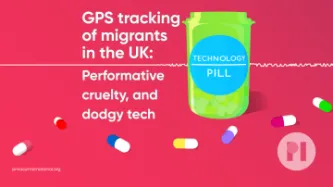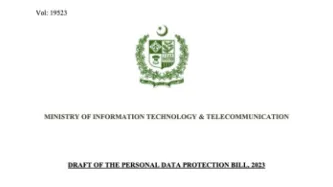Search
Content type: Examples
The UK's Information Commissioner's Office (ICO) has reprimanded the Chelmer Valley High School in Chelmsford, Essex for unlawfully implementing facial recognition technology in its canteen. The school failed to perform a data protection information assessment, and didn't get adequate permission to process their students' biometric data or ask students to give consent by opting in. North Ayrshire Council - who implemented facial recognition in nine schools in Scotland - have also been warned by…
Content type: Examples
The UK's Department of Education intends to appoint a project team to test edtech against set criteria to choose the highest-quality and most useful products. Extra training will be offered to help teachers develop enhanced skills. Critics suggest it would be better to run a consultation first to work out what schools and teachers want.Link to article Publication: Schools WeekWriter: Lucas Cumiskey
Content type: Examples
The UK's new Labour government are giving AI models special access to the Department of Education's bank of resources in order to encourage technology companies to create better AI tools to reduce teachers' workloads. A competition for the best ideas will award an additional £1 million in development funds. Link to article Publication: GuardianWriter: Richard Adams
Content type: Examples
The Los Angeles school district turned off “Ed”, a $6 million chatbot, after the company paid to develop it got into financial trouble. The incident provides a cautionary tale for Britain’s new Labour government, which has talked of using AI in schools to free up teacher time and revive public services on a tight budget, as has a report issued by the Tony Blair Institute. The failure of the algorithm used to predict GCSE and A-level grades during the covid lockdown and the potential to increase…
Content type: Long Read
Social media is now undeniably a significant part of many of our lives, in the UK and around the world. We use it to connect with others and share information in public and private ways. Governments and companies have, of course, taken note and built fortunes or extended their power by exploiting the digital information we generate. But should the power to use the information we share online be unlimited, especially for governments who increasingly use that information to make material…
Content type: Examples
Former delivery driver Edrissa Manjang is pursuing a claim for harassment, indirect discrimination, and victimisation in UK courts, alleging that a racially-biased algorithm kicked him off Uber Eats' ride-sharing app. After Uber Eats supplied information that contradicted Manjang's original claims, the judge gave him leave to amend his complaint but refused him permission to use emails sent him during the litigation as evidence of harassment. Manjang, who is black and of African descent, says…
Content type: Examples
A new poll from the trade union Prospect finds that 58% of UK workers believe government should protect jobs by regulating the use of generative AI. Only 12% believe government should not interfere. The poll also found that workers are deeply uncomfortable with being surveilled at work and about companies' use of software to automate decisions about hiring and promotion.https://prospect.org.uk/news/public-call-for-government-regulation-of-generative-ai-at-work Publication: Prospect
Content type: Examples
Following a February 2024 ruling by the Information Commissioner's Office against Serco Leisure, national leisure centre chains are among dozens of UK companies removing or reviewing the use of facial recognition and fingerprints to monitor staff attendance. The ICO found that the Serco subsidiary had unlawfully processed the data of more than 2,000 employees at 38 centres.https://www.theguardian.com/business/2024/apr/16/leisure-centres-scrap-biometric-systems-to-keep-tabs-on-staff-amid-uk-data…
Content type: Report
The methodology employed for this report consists primarily of in-depth interviews held with grassroots political workers and representatives of collectives. The researchers interviewed 14 individuals from various social justice causes such as womens’ rights, climate change, transgender rights, students’ rights and the right to universal internet access in Pakistan. The experiences they have shared with the interviewers along with the real-time developments in the country’s law and order…
Content type: Advocacy
BackgroundThe Snowden revelations and subsequent litigation have repeatedly identified unlawful state surveillance by UK agencies. In response, the UK Parliament passed the highly controversial Investigatory Powers Act 2016 (IPA), which authorised massive, suspicionless surveillance on a scale never seen before, with insufficient safeguards or independent oversight.Privacy International led legal challenges to this mass surveillance regime both before and after the Act became law. The Act…
Content type: Examples
Some UK schools have bought and installed sensors in toilets that 'actively listen' to pupils' conversations to try to detect keywords spoken by pupils. The sensors are being sold to detect vaping, bullying, and other problems. However, privacy campaigners say these sensors are potentially a safeguarding issue, a violation of children's rights, and are likely to be unlawful. The sensors do not record or save any conversations, but send alerts to staff when triggered. Not all the schools…
Content type: Video
We explore the legal case, the ways the tag hasn't worked for long periods of time, and a dubious AI the Home Office has been using in decisions as to whether someone remains on a GPS tag.LinksRead more from Katie's law firm, Wilsons Solicitors, about the casePI's Complaint to the ICO (the UK's Data Protection Authority)Read more about relevant cases in which PI has filed witness evidenceThe five companies at the heart of the UK's GPS tagging systemWe tested GPS ankle tags, read how our…
Content type: Examples
An app used by more than 100 Bristol schools has raised concern among criminal justice and anti-racism campaigners that the easy access it gives safeguarding leads to pupils' and their families' contacts with police, child protection, and welfare services risks increasing discrimination against those of minority ethnic or working class backgrounds. Staff using the app say the app is often kept secret from parents and carers. The council website says the Think Family database, which the app…
Content type: Examples
UK government ministers are seeking to ensure schools benefit financially from any future use of pupils’ data by large language models such as those behind ChatGPT and Google Bard. Data from the national pupil database is already available to third-party organisations. The BCS head of education recommends that the Department of Education should write a clear public benefits statement to ensure that initiatives benefit pupils as well as providing financial benefits.https://schoolsweek.co.uk/…
Content type: Examples
The UK's Behavioural Insights ("Nudge") Unit has trialled machine learning models to help automate some decisions made by regulators such as Ofsted (schools), and the Care Quality Commission (health and social care in England). The resulting algorithm uses data such as the number of children are on free school meals, teachers' pay, the number of teachers for each subject, and parents' reviews of schools in order to predict which schools' performance might be suffering. The dataset deliberately…
Content type: Examples
English school head teachers were asked to fill out a census form designed in partnership with the Department of Education and hosted by Capita that included fields asking for pupils’ asylum status, ethnicity, and passport numbers and export dates. Families are meant to be advised it’s not mandatory to supply the information, but when they don’t schools “ascribe” - that is, guess - children’s ethnicity. Privacy campaigners expressed concern that the census data would be used for immigration…
Content type: Examples
ICO warns North Ayrshire Council for adopting facial recognition in schools without parental consent
The Office of the Information Commissioner has warned Scotland's North Ayrshire council that it has likely infringed data protection law by using facial recognition technology in nine schools. North Ayrshire used the iPayimpact contactless system for payment for meals, and claimed that 97% of parents had given consent. The ICO said that although consent was the appropriate legal basis, the requirements had not been met, and the council needed to explain how students' data will be collected,…
Content type: Explainer
The Free to Protest Guide Pakistan has been created by adapting Privacy International's (PI) Free to Protest Guide UK according to the laws and policies of Pakistan, in collaboration with PI and local activists in Pakistan.The Guide has been published in English, Urdu, Punjabi and Pashto.DISCLAIMER: This guide forms part of PI's global work to highlight the range of surveillance tools that law enforcement can use in the protest context, and how data protection laws can help guarantee…
Content type: Examples
A new report from Worker Info Exchange finds that drivers working for Just Eat have had their accounts abruptly de-activated by automated systems for alleged overpayments as small as £1.35, which many are contesting. Just Eat says that the overpayments were triggered because drivers had incorrectly recorded themselves waiting for an order when their GPS coordinates did not show them at the restaurant. In several cases, the GPS data however showed that they remained within a couple of minutes’…
Content type: Examples
A survey commissioned by the UK's Information Commissioner's Office finds that a fifth of UK adults believe they have been monitored by an employer. Timekeeping and access were most commonly tracked, followed by emails, files, calls, or messages. Seventy percent said they would find such monitoring intrusive. Studies say that excessive tracking is associated with higher staff turnover rates and can be counterproductive. https://www.theguardian.com/world/2023/oct/02/uk-adults-monitored-by-…
Content type: Examples
In a legal action, the Independent Workers Union of Great Britain and the App Drivers and Couriers Union claim that Uber's use of facial recognition software for its Real-Time ID Check to verify the identity of drivers is discriminatory because facial recognition software is known to be less accurate at identifying people with darker skin. The action was brought on behalf of two drivers whose accounts were terminated following errors made by the Microsoft-supposed facial recognition software.…
Content type: Examples
Employees monitored by monitoring tools such as Hubstaff, CleverControl, and FlexiSPY report that the software takes a screenshot every ten minutes and calculate an activity score based on how they type and move their mouse. Aware that employers are looking at these scores, employees pause the tracker while they perform tasks such as participating in Zoom meetings, watching videos, or taking notes, which then requires them to work more hours to make up the time. A TUC poll in 2022 found that 60…
Content type: News & Analysis
Privacy International (PI) is concerned by developments in Pakistan regarding the enactment of the Draft Personal Data Protection Bill, 2023 and the opaque process which will see the bill become law.
The Bill was published on 19 May 2023 by the Ministry of Information Technology and Telecommunication ('MITT'). However no open and inclusive consultation was open for comments to be submitted to the MITT. In a concerning development it was reported that the Bill was approved by the Federal…
Content type: Examples
The UK Information Commissioner's Office has reprimanded North Ayrshire council for installing iPayimpact facial recognition technology in nine schools without obtaining adequate consent. The system was intended to speed cashless lunch payments. The council withdrew the system and deleted the data after the ICO's ruling.
https://techmonitor.ai/policy/privacy-and-data-protection/facial-recognition-technology-school-ico
Writer: Sophia Waterfield
Publication: TechMonitor
Content type: Examples
In a report, the UK's Digital Futures Commission warns that the explosion of use of education technology brings risks to children's privacy, especially that the data it collects, much of it personally identifiable, will be entered into the heavily commercial global data ecosystem, with uncertain consequences for the future. Although schools have returned to in-person learning, tools such as Google Classroom and Class Dojo have become permanently entrenched even though they have "opaque" privacy…
Content type: Long Read
In the UK, successive government ministers and members of parliament have made emotive proclamations about the malaise of "public sector fraud".
This year, former Work and Pensions Secretary Therese Coffey said that the welfare system "is not a cash machine for callous criminals and it’s vital that the government ensures money is well spent...[and] fraud is an ever-present threat."
In 2013, the UK's minister for the disabled made numerous claims that there were "vast numbers of bogus disabled […
Content type: Examples
The Welsh Local Government Association is collaborating with the Centre for Digital Public Services on an 8-to-12-week discovery project to help local authorities to understand schools' requirements for information management systems and understand the market offerings in order to formulate a needs-based procurement specification. The project is intended to produce a shared set of core requirements and will look at user need for establishing one or more core datasets, individual schools'…
Content type: Examples
During a remotely proctored online exam, a number of students on the Bar Professional Training Course urinated in bottles and buckets and wore adult diapers rather than risk the possibility that their exam would be terminated if they left their screens long enough to go to the toilet. The Bar Standards Board responded to the story by saying that students are warned in advance that they will not be able to leave the room during an online exam and that they should take the exam in a test centre…
Content type: Examples
In September 2022, the UK Department for Education announced that under a £270,000 contract with Suffolk-based Wonde Ltd it would collect data on children's school attendance and potentially share it with other government departments and third parties as part of its drive to raise attendance. A visualisation tool will create an interactive national attendance dashboard to run alongside the publication of fortnightly attendance data that the DfE says will provide "ongoing transparency". LSE…
Content type: Examples
Environmental campaigners wrote to Scottish first minister Nicola Sturgeon asking her to intervene to ensure the right to protest was upheld during COP26, when as many as 10,000 police officers from all over the UK were deployed per day on the streets of Glasgow. The letter said the police were reportedly filming campaigners, eavesdropping on conversations, unlawfully demanding personal details, and in one case followed a group to where they were staying even though no protest was in progress.…





